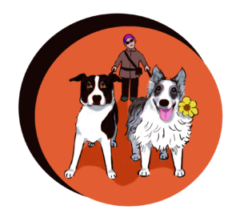This week I came across an Open Letter to My Students by an Agility Instructor and it stood out for many reasons. I shared it in the Teaching Dog Trainers How to Teach People Facebook Group thinking it might stir up some discussion. My question to the group was:
This Open Letter to My Students makes me want to write an Open Letter to My Teacher. What should it say?
I assumed others would take issue with the very teacher-centric thinking expressed in the open letter, but there was no uptake. I noticed the article being shared around in social media, but the reactions were mostly instructors nodding in agreement, or students slumping down in their seats declaring their guilt.
It got me wondering, is it common for trainers/instructors to feel this level of frustration with students? Is is typical for instructors to believe that they are doing everything possible to help their students learn, and that students are entirely responsible for their own success in a class?
So I decided to write an Open Letter To My Teacher. It’s just a draft, waiting for your additions and edits…
To My Teacher:
Thank you for caring about my success in becoming the best dog handler and guardian that I can be. As your student, I want this to be an excellent learning experience for me and my dog. Here’s how you can help:
– Begin the class at the scheduled time. If you run consecutive classes, allow enough transition time for one set of students and dogs to leave, and the next set to enter and get set up.
– Prepare learning plans. It can be flexible, but show that you have thought about what we will be doing that day.
– Be as ‘present’ as possible during the time we have together. If you find you are consistently rushed or distracted, you may be taking on too much.
– Distribute a course syllabus, guidelines for managing our dogs, class “rules”, and expectations. We want to know what is expected of us.
– Find out if anyone has any special “asks”.
e.g. Can I move my dog to the corner to give him more space?
Can I skip doing the group activity today? Benji seems more anxious than usual.
Tell us your special “asks” as well.
– Plan and organize the learning space. If you need help, decide how that will be done and what those who aren’t helping should be doing. Don’t expect us to jump in to help you arrange props and equipment without being asked.
– Help us to understand your way of working. For example, if you like to take advantage of a learning breakthrough, and will spend extra time in class working with a specific team, let us know that. Then we won’t be wondering why we’re having to wait so long for our turn.
– Let us know that we are responsible for our own comfort and well being. Visits to the washroom are completely acceptable and expected. Stopping to put on a jacket while everyone waits is ok.
– Don’t try to cram too much into one lesson. Make room for questions and reflections.
– Determine if everyone in the class will benefit from hearing your responses to an individual’s question. If so, include us all. If you feel it would be more appropriate to have a discussion with just that individual, make space to do that when we’re engaged in other activities.
– Build in time for socialization. We learn from one another, so making these connections is important.
– Understand that we all arrive to a course or workshop with different goals and ambitions.
– Admit when you’re stuck on solving a problem, or you don’t have an answer at your fingertips. Why not ask your students to jump in with ideas?
– There are infinite reasons why we might miss something you say. It could be that you are not waiting for us to be ready listen. It’s possible you are telling us too much at once, or we might be tending to the needs of our dog. Maybe we find the volume or pitch of your voice irritating. 🙂 Remember, important information is always worth repeating.
– If you choose not to address our questions because you think we should already know the answer, you are missing the point of what good teaching is.
– You could be a huge influence on what we choose to do in the future. Think beyond the specific class, and how you might help us to develop more enthusiasm for learning and advancing.
– If you notice that we aren’t understanding instructions, think how you might be more effective in delivering the information.
– Important concepts take time and effort to grasp. It might not be enough to simply tell us something. Often we need analogies, repetition, practice, examples, etc. Also keep in mind that we can learn a lot by problem solving and developing ideas on our own and with our peers.
– Create a safe environment for trying new things, making mistakes, and taking risks. At the same time, allow us to opt out of performing and speaking in front of others.
– You have a lot of expertise, and we want to learn from you. However, we also come with expertise. Provide opportunities to learn from us as well. For starters, let us help you to improve your teaching.
Thank you for listening,
Your Students
Afterthoughts, from reading comments about this open letter
– Remember that the dogs are not the only ones who need positive feedback! We need it, too. Point out areas we need to work on, but remember to reinforce our behaviour when we get it right.

